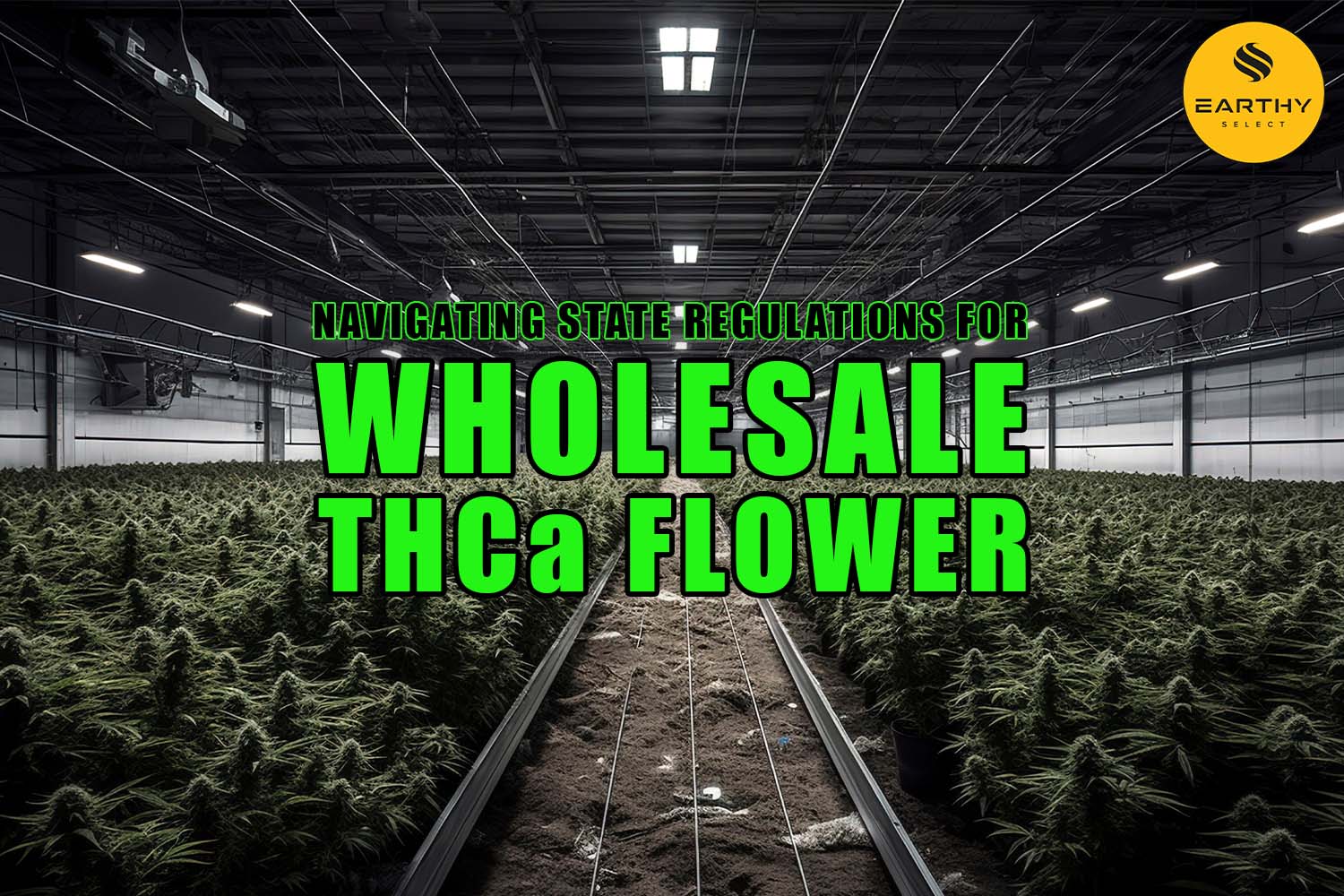Navigating State Regulations for Wholesale THCA
In the landscape of the flourishing cannabis industry, wholesalers engaged in the distribution of THCa hemp flower encounter a complex legal environment. Yet, the success of these retailers hinges on their ability to comprehend and adhere to various crucial guidelines. These strictures include state regulations as well as federal law regarding all products derived from cannabis plants [1]. Additionally, businesses interested in selling THCa flower products need to understand the nuances of its particular legal status in their state. This comprehensive guide delves into the intricate web of state regulations for wholesale THCa distribution, highlighting Earthy Select as a dedicated partner committed to ensuring compliance.
The complex legal landscape for wholesale THCa
The legal status of THCa flower is far from uniform across states, presenting wholesalers with a multifaceted challenge in navigating state regulations. For example, compliance entails not only a thorough understanding of cannabis laws but also factors such as Delta-9 THC limits, licensing requirements, and adherence to each state’s unique stipulations [1].
Wholesale THCa Flower: A Complete Buyer’s Guide
THCa legality and the 2018 Farm Bill
Thanks to the 2018 Farm Bill, THCa flower is federally legal. In essence, the bill made all hemp derivatives federally compliant as long as they contain no more than 0.3 percent Delta-9 THC on a dry weight basis. Since THCa is chemically different from Delta-9 THC, it is allowed in higher concentrations under federal law, including in THCa flower [2].
Before a plant or product becomes federally compliant, it is tested to verify that it contains no more than 0.3 percent Delta-9 THC. Except for a few states, THCa is not included in the post-harvest THC test. Plants are tested before decarboxylation. This means that the plants are tested before the THCa turns to THC. For this reason, THCa flower can be sold legally in most states if it maintains the lawful hemp concentration of 0.3 percent Delta-9 THC or less [2].
Delta-9 in California: Navigating the Restrictions
Earthy Select: your compliance partner
In navigating this intricate legal landscape around distributing hemp plant products, Earthy Select emerges as a trusted ally. Indeed, their expertise extends beyond general compliance to encompass the fine print. Thus, wholesale customers partnering with Earthy Select benefit from a commitment to compliance that simplifies the complexities inherent in cannabis law enforcement. This makes the process of adhering to state and federal laws much easier for businesses.
State-specific THCa laws
Fundamentally, successful navigation of THCa regulations requires a deep understanding of state laws. Specifically, each state has established their own regulations governing THCa hemp flower distribution [3]. These regulations encompass Delta-9 THC limits, licensing protocols, and approved product variations. Helpfully, Earthy Select’s experts are well-versed in these state regulations for wholesale THCa products. Thus, their team can provide invaluable guidance to ensure compliance with each jurisdiction’s unique requirements.
THCa and State Compliance: Is it Legal in My State?
Licensing and permits
To legally sell cannabis products, including THCa flower, businesses must obtain various licenses and permits to ensure compliance with stringent regulations. Obtaining licenses often involves navigating levels of Delta-9 THC, which is a controlled substance under federal law. As hemp-derived products fall under the purview of both federal and state regulations, businesses must adhere to the legal limits of each. According to the 2018 Farm Bill, the federal limit caps Delta-9 THC at 0.3 percent [4]. Negotiating the intricacies of state-specific regulations, especially in regions with very strict cannabis laws, demands a deep understanding of the cannabis law surrounding both medical and recreational marijuana and hemp.

Additionally, licensing requirements may vary based on the distinctions between industrial hemp and marijuana. Therefore, businesses often need to navigate strict marijuana laws, along with hemp laws, enforced by a state’s law enforcement agencies. Ensuring compliance with the legal limit of less than 0.3 percent Delta-9 THC becomes crucial for businesses in states where marijuana is illegal [5]. For hemp-derived THCa products, businesses must adhere to specific state guidelines to maintain THCa’s legal status. In jurisdictions where hemp laws are stringent, businesses must carefully navigate the legal framework to obtain the necessary licenses and permits to sell hemp-derived THCa products. By doing so, they ensure they remain within the legal limits and uphold THCa legality.
Assistance with obtaining licenses and permits
Securing the necessary licenses and permits is a pivotal aspect of navigating the landscape of cannabis law enforcement. Therefore, adherence to federal guidelines and compliance with state laws are indispensable. Earthy Select’s expert assistance streamlines the process, ensuring wholesalers operate under state law as well as the stringent standards set by the federal government.
Buy THCa Flower in Texas: Buying Guide for the Best THCa
Testing and reporting requirements
Compliance with testing protocols is crucial to ensuring the quality and safety of THCa flowers. For example, rigorous lab testing procedures, encompassing checks for potency and contaminants, are essential [6]. Earthy Select’s commitment to product safety guarantees that their THCa flowers meet testing requirements, helping wholesalers operate within the bounds of the law.
Labeling and packaging regulations
Meeting state-required labeling and packaging standards for cannabis products, including THCa flower, is imperative to avoid legal consequences [7]. To make this process easier, Earthy Select’s compliance-ready packaging solutions meet federal and state regulations. As a result, wholesale customers benefit from knowing their cannabis products are both fully compliant and presented professionally and attractively.
Key legal considerations for wholesale THCa hemp flower customers
- Q: What state-specific regulations for wholesale THCa should I be aware of?
- Familiarize yourself with Delta-9 THC limits, licensing, and labeling standards in your specific state.
- Q: How can Earthy Select help me obtain licenses and permits for THCa distribution?
- Earthy Select follows all regulations ensuring a smooth and compliant operation.
- Q: What are the typical testing requirements for THCa products in different states?
- Testing requirements include potency, contaminants, and pesticides [6]. Earthy Select’s procedures comply with these requirements. However, a few states have additional restrictions regarding hemp-derived products, including THCa. Therefore, businesses need to research state-specific laws before purchasing [3].
- Q: How does Earthy Select ensure compliance with labeling and packaging regulations across states?
- Earthy Select’s labeling and packaging solutions meet mandated standards, ensuring legal compliance and professional presentation.
Product transport and security
Ensuring secure and compliant transportation is aligned with state and federal regulations to maintain product integrity [8]. Earthy Select’s shipping safety protocols adhere to cannabis laws, giving wholesalers confidence in legal compliance during product transit.
Environmental and sustainability regulations
In an era of increased environmental awareness, adherence to eco-friendly practices is not just a preference but a necessity [9]. Earthy Select’s sustainable sourcing initiatives contribute to a greener industry, aligning seamlessly with the growing demand for environmentally responsible practices.
Navigating the Legal Landscape of THCa: Which States Allow THCa Concentrates?
Key takeaway: partner with Earthy Select for compliance assurance
Earthy Select’s regulatory expertise in wholesale THCa distribution emerges as a beacon of guidance, simplifying the challenges posed by the diverse and ever-evolving legal landscape. With Earthy Select as a wholesale partner, navigating state and local laws becomes not only manageable but an anchor for sustainable and compliant business operations.
Embark on a seamless journey to legality and success by partnering with Earthy Select. Offer your customers the best THCa flower strains and other premium hemp-derived products. Contact Earthy Select today to unlock a world of regulatory expertise and legally compliant THCa hemp flowers for your cannabis business.
Read moe: The Legalities of Wholesale THCa Flower Distribution
Medical Disclaimer / Legal Disclaimer – Information is provided for educational purposes. It does not and is not intended to constitute legal advice or medical advice. We attempt to be accurate and up-to-date, but the legality of cannabinoids and the science of cannabis are evolving. The author is neither a legal professional nor a medical expert. Before buying or using any products, you should check with your local authorities and medical providers.
References
- Is THCa Legal? State By State Legality of a Promising Cannabinoid
- THCa Flower: The Next Big Thing in Hempland
- The Legality of THCa: The State Line is the Bottom Line
- Hemp Production and the 2018 Farm Bill
- How to Get a Cannabis Distribution License
- Importance of Third-Party Lab Tests for Cannabis
- Cannabis Packaging Compliance Guidelines
- The Ins and Outs of Transporting Cannabis
- Sustainability in the Cannabis Industry
Frequently Asked Questions
What state-specific regulations for wholesale THCa should I be aware of?
Familiarize yourself with Delta-9 THC limits, licensing, and labeling standards for your state and other states you intend to to business in to ensure compliance [1].
What are the typical testing requirements for THCa products in different states?
Testing protocols can include testing for cannabinoids, potency and contaminants [6].
Can I sell THCa flower in South Carolina?
Though there are currently no restrictions on THCa in South Carolina, it is advisable to consult with legal professionals or relevant authorities in South Carolina to ensure compliance [1].



